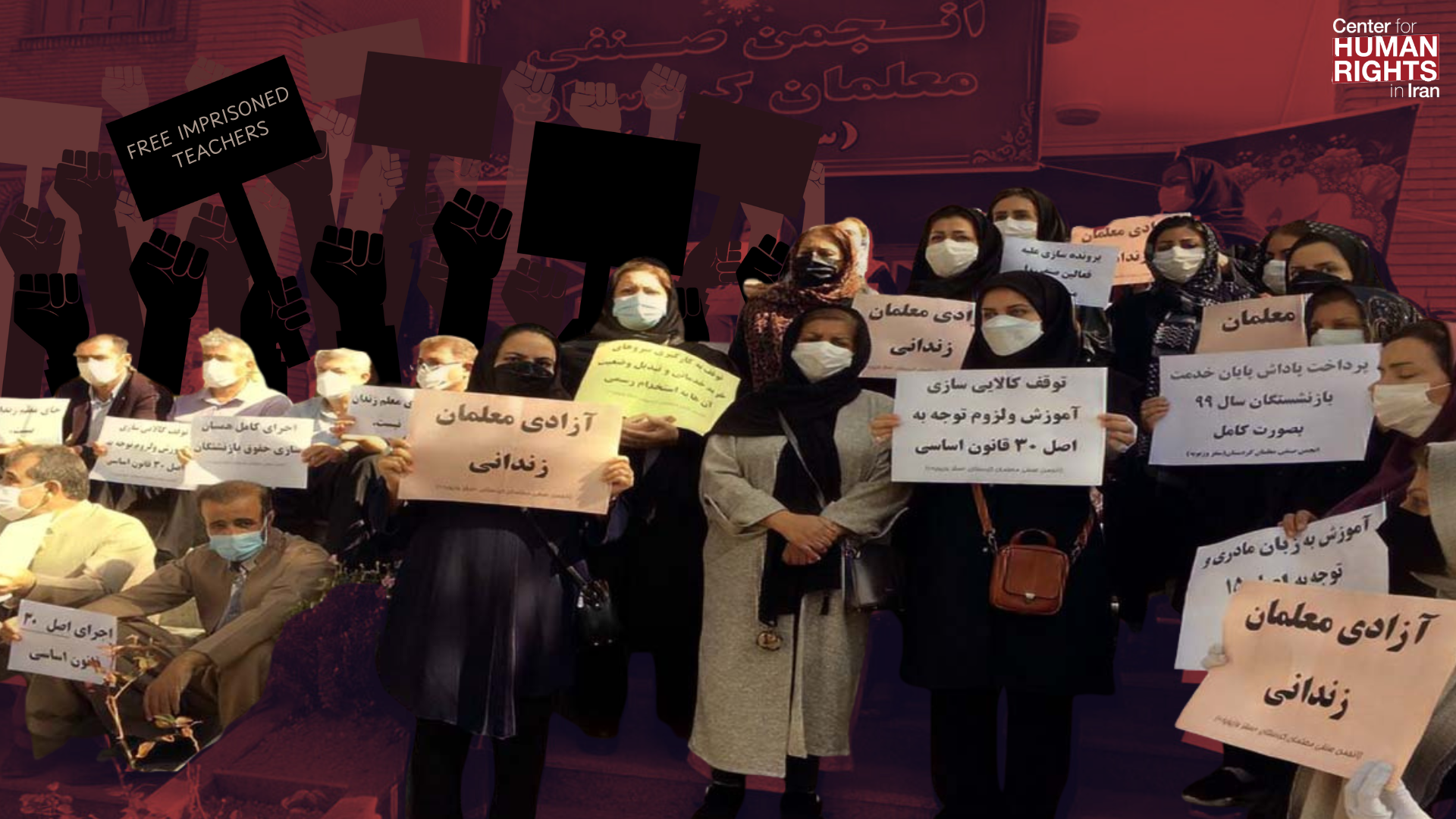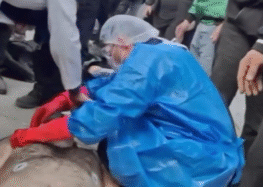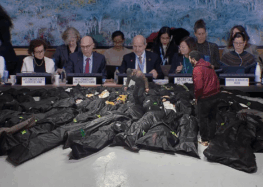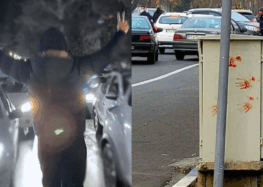Iran Intensifies Crackdown on Teachers: Dozens Arrested, Fired, or Sentenced for Peaceful Union Activity

At Least 45 Teachers Unlawfully Targeted During Summer School Break
“The judicial proceedings and security pressures against these teachers have been completely unlawful”
September 17, 2025 – Iranian authorities have intensified their crackdown on teachers and teachers’ union members, with at least 45 teachers interrogated, arrested, or sentenced since the end of the last school year in June 2025 and the start of the new school year in September 2025, according to new findings by the Center for Human Rights in Iran (CHRI).
The teachers have been relentlessly targeted by the state for their peaceful advocacy and independent union activities—which are seen as prosecutable offenses in the Islamic Republic—and their demands for the release of imprisoned teachers, livable salaries, decent working conditions, and access to free education for all children.
CHRI calls on all relevant UN bodies, including the International Labor Organization (ILO) and UNESCO, international teacher associations, and unions worldwide to demand the immediate and unconditional release of all imprisoned teachers in Iran.
The arrests span several provinces, including Kerman, Kurdistan, Gilan, West Azerbaijan, Isfahan, and Tehran, highlighting the scope of the crackdown. Teacher union activists report that dozens of additional cases remain open in Iran’s courts, with many educators still facing charges related to peaceful trade union activities.
The repression has been particularly severe in smaller towns and Kurdish-populated areas, where authorities have escalated prosecutions following the 2022 Woman, Life, Freedom nationwide protest movement, in which Kurdish communities heavily participated.
“Teachers have long been at the forefront of peaceful protests in Iran, for teachers’ rights, children’s educational rights, and broader human rights in Iran. In response, authorities have used judicial harassment, arbitrary detention, and heavy prison sentences to silence their voices,” said Esfandiar Aban, Senior Researcher at the Center for Human Rights in Iran (CHRI).
“The Islamic Republic’s persecution of teachers reflects the regime’s complete intolerance for any activity not fully controlled by the state, let alone any peaceful dissent, and their particular targeting of Kurdish teachers reflects their fear of the continued resilience and independence of this community,” Aban said.
In addition to the release of all imprisoned teachers, CHRI calls on all relevant UN bodies to activate their monitoring mechanisms and hold Islamic Republic representatives accountable in their specialized sessions.
The international community should also demand that the Iranian authorities cease all prosecutions of teachers and recognize the right of independent teacher unions to organize, collectively bargain, strike, and peacefully protest. Global teachers’ unions and associations, meanwhile, should consider launching joint international campaigns in solidarity with Iranian teachers, beyond individual statements of support.
“Totalitarian regimes fear informed citizens—this is why they suppress us.” — Esmail Abdi, prominent Iranian teachers rights activist
Security Forces Raid Teachers’ Council Meeting in Isfahan
On September 16, 2025, security forces raided a meeting of the Coordinating Council of Iranian Teachers’ Trade Associations in Shahreza, Isfahan Province, arresting 18 teachers’ representatives and union activists and seizing their belongings.
According to the Coordinating Council, 17 teachers were released after about eight hours of interrogation, but prominent teachers’ union activist Masoud Farhikhteh remains in detention.
Farhikhteh was previously sentenced to over four years in prison in August 2025 by Branch 12 of the Alborz Province Court of Appeal for “assembly and collusion against internal security” and “propaganda against the regime.” The Coordinating Council said that the continued detention of Farhikhteh raises concerns that he may be taken to prison to serve his sentence.
The arrests coincided with the heightened state security that has surrounded the third anniversary of the state killing of Jina (Mahsa) Amini, which triggered the Woman, Life, Freedom protests.
The Coordinating Council of Iranian Teachers’ Trade Associations said in a statement:
“The Coordinating Council of Iranian Teachers’ Trade Associations strongly condemns this blatant raid, stressing that the authorities not only show zero tolerance for independent union and collective activities, but also target teachers’ most basic right to hold internal assemblies through coercion and intimidation. The council demands the immediate release of Masoud Farhikhteh and the prompt return of all confiscated personal belongings, and reaffirms its commitment to defending teachers’ rights.”
Peaceful Protests, Harsh Punishments
Despite teachers repeatedly emphasizing that their union activities and protests are peaceful and lawful, they continue to face summons, arrests, forced retirements, dismissals, and job bans. Many cases remain pending in Iranian courts, while others are serving sentences under restrictive measures such as electronic ankle monitors.
Afshin Razmjooei, a retired teacher from Shiraz who is serving a two-year prison sentence under electronic monitoring for her participation in peaceful teacher protests, told Shargh newspaper:
“The distance I’m allowed to travel with the ankle monitor cannot exceed one kilometer from my residence. This year, I was able to take a teaching job at a private school. At 5 a.m. I would put my ankle monitor on charge, and by 6:30 a.m. I was at school. The device’s battery would run out by noon, and the prison would repeatedly call me, which created a terrible situation in class. On the other hand, I couldn’t plug in the monitor to charge in front of the students or explain the situation to them.”
Over Eight Years in Prison for Eight Teachers in Kerman
On August 5, 2025, Branch 1 of the Revolutionary Court in Kerman sentenced eight teachers and union activists to a total of eight years and six months of prison. They were charged with “insulting the Supreme Leader,” “propaganda against the regime,” and “membership in opposition groups” for participating in and/or helping to organize peaceful teacher protests and union activities. These sentences are not yet final and can be appealed.
- Majid Naderi was sentenced to one year in prison for “membership in a group opposing the regime to disrupt national security,” four months for “propaganda against the regime,” and four months for “insulting the Supreme Leader.”
- Hossein Rashidi Zarandi received one year for “membership in a group opposing the regime to disrupt national security,” and four months for “insulting Khomeini and Khamenei.”
- Mohammadreza Behzadpour was sentenced to one year for “membership in a group opposing the regime to disrupt national security,” and four months for “propaganda against the regime.”
- Fatemeh Yazdani, Mitra Nikpour, Zahra Azizi, Leila Afshar, and Shahnaz Rezaei Sharifabadi were each sentenced to six months for “membership in a group opposing the regime to disrupt national security,” and four months for “propaganda against the regime.”
The indictment states that the basis for the case against these individuals was a report by the Islamic Revolutionary Guard Corps’ (IRGC) Intelligence Organization, followed by investigations into the teachers’ participation in private group chat activities regarding teacher union activities, which were used as the grounds for some of the charges against them.
A source familiar with the case of these eight teachers told CHRI:
“This judicial case was initiated following a complaint by the Kerman Province Intelligence Organization of the IRGC, in connection with peaceful union gatherings held by the teachers.
“Security agents from the Ministry of Intelligence and the case interrogators used the ‘good cop, bad cop’ tactic. At present, the so-called ‘good cop’ has told the teachers that they will try not to take any further action against them and close the case, on the condition that the teachers refrain from providing any information about the case or the judicial process.
“The judicial proceedings and security pressures against these teachers have been completely unlawful, and many union activists and teachers believe that informing the public about such unlawful actions is itself a form of resistance and rights-seeking.
“None of the teachers involved in this case had any prior criminal or judicial record, and all of them were respected educators in the city, teaching at gifted and exemplary public schools.”
Intensified Crackdown in Kurdistan
Teachers in Kurdistan have been especially targeted by the state because of the strength of the independent teacher unions in this region, as well as the fact that the Kurdish community on the whole, and especially any peaceful dissent, activism or protest within it, is viewed as suspect by the regime and subjected to intense state scrutiny and harsher punitive actions.
The Kurdistan Teachers’ Trade Association announced in two statements, dated August 18 and 19, 2025, the issuance of unprecedented disciplinary rulings against 14 Kurdish teachers for their participation in peaceful protests and independent teacher union activities. Some of the teachers punished under these rulings had previously faced arrests for their union activities such as strikes, peaceful protests, or publicizing details about their unlawful prosecutions by the state.
The association listed the names and disciplinary measures as follows:
- Nasrin Karimi: Forced retirement with demotion of two professional grades
- Leila Zarei: Removal from her deputy school principal position and forced retirement with demotion of one grade
- Salah Hajimirzaei: One-year suspension from service
- Faisal Nouri: Five-year exile to Kermanshah province
- Majid Karimi: Permanent dismissal and removal from all government services
- Ghiyas Nemati: Permanent dismissal from the Education Ministry
- Shahram Karimi: Six-month suspension from service
- Loghmanollah Afzali Allahmoradi: One-year suspension from service
- Soleiman Abdi: Forced retirement with demotion of two grades
- Omid Shah-Mohammadi: Permanent removal from government services
- Hiwa Qureshi: Dismissal from the Education Ministry
- Kaveh Mohammadzadeh: Dismissal from the Education Ministry
- Parviz Ahsani: Dismissal from the Education Ministry
- One additional teacher (name withheld for security reasons): Dismissal
The rulings of “permanent dismissal and removal from all government services” issued against Omid Shah-Mohammadi (member of the Divandarreh Teachers’ Association) and Majid Karimi (member of the Sanandaj Teachers’ Association) mean their complete exclusion from the state system and termination of all related rights and benefits. These teachers are also deprived of pension and social security coverage.
The Teachers’ Association of Kurdistan-Sanandaj stated:
“In the past two years, especially after the teachers’ association elections in Sanandaj, held in May 2024 with official correspondence to the Kurdistan governor’s office and partly online, intense pressure and attacks were imposed on the election organizers. Immediately afterward, disciplinary cases were opened against the elected board members by the Education Ministry’s Disciplinary Committee.”
Following widespread reactions to these rulings, Fars News Agency, affiliated with the IRGC, confirmed the dismissals of several Kurdish teachers (without naming them), repeating state security narratives. It alleged that these individuals “abused their professional positions by closing schools, threatening other teachers, and staging illegal sit-ins to incite unrest and disrupt education.” The report further accused some teachers of “contacts and meetings with PJAK in the mountainous regions of Divandarreh, including Sultan Mountains, Dobra, and Nargesleh village.”
On Friday, August 29, 2025, in response to a call from the “People’s Committee in Support of Kurdistan’s Teachers,” civil, political, union, and labor activists held a mountain hike rally in Sanandaj to show solidarity with the 14 teachers.
An informed source told CHRI:
“One day before this solidarity gathering, four teachers — Nasrin Karimi, Majid Karimi, Salah Hajimirzaei, and Loghman Afzali Allahmoradi— were summoned by phone to the national police intelligence office and interrogated and threatened for several hours.”
CHRI has documented that repression of Kurdish teachers has intensified since the “Woman, Life, Freedom” movement. In addition to the 14 teachers punished in August 2025, other cases include dismissals, suspensions, and forced retirements, such as:
- Leila Salimi, a union activist from Sanandaj, was fired in 2024 and later sentenced to a two-month suspension for her teacher union activity and social media posts critical of government policy.
- Somayeh Akhtarshomar, a female teacher from Marivan with 17 years of service, was fired in early 2024 by the Administrative Court. She was accused of “supporting anti-state groups,” “publishing insulting content and spreading false news against the Islamic Republic,” “active membership in illegal teachers’ union channels,” “designing English exam questions in support of rioters,” and “supporting opposition groups in Iraqi Kurdistan online” for her membership in an independent teacher union, her social media activity (which was critical of government policy), and her peaceful activism.
A Kurdish teachers’ union activist told the Kurdistan Human Rights Network that at least 70 additional teachers in Saqqez and Sanandaj have been given suspension orders for their participation in peaceful protests, union activities, or social media activity, but were pressured not to publicize them in exchange for possible reductions on appeal.
List of teachers and union activists who have faced judicial and security actions between mid-June 2025 and mid-September 2025:
- Iraj Ansari, board member of the Hamadan Teachers’ Union, was summoned to Branch 10 of the Hamadan Prosecutor’s Office. The charges against him included “insulting the Supreme Leader” and “propaganda against the state.”
- Asghar Amirzadegan, a teacher and union activist from Fars Province, returned to Firouzabad Prison at the end of his leave on June 10, 2025. He was arrested on April 11, 2025. He was sentenced to two years in prison on charges of “insulting the Supreme Leader” and “insulting the founder of the Islamic Republic” and one year in prison for “propaganda against the state” by Branch 1 of the Firouzabad Revolutionary Court on February 12, 2025.
- Zina Faridounian, a retired teacher from Qorveh, was sentenced in two separate cases by the Revolutionary Court of Qorveh to a total of over 13 months in prison and three years of suspended imprisonment. She has also been banned from leaving the country. The charges include “propaganda against the state.”
- Forough Khosravi, a primary school teacher living in Behbahan, was arrested by agents of the IRGC Intelligence Organization on July 29, 2025. Earlier, on June 20, her home had been searched in her absence and her mobile phone confiscated.
- Bakhtiar Rezvani, a teacher in Gachsaran, was summoned in July 2025 to Branch 4 of the Gachsaran Prosecutor’s Office after receiving a judicial notice to respond to the charge of “propaganda against the state.” Later, the Revolutionary Court sentenced him to a fine of 90 million rials instead of a three-month prison term. He has previously faced security-related reprisals for his activism.
- Fourteen union activists in Saqqez and Divandarreh were given disciplinary rulings by the Ministry of Education’s appeals board. These included dismissal, expulsion from education, forced retirement, and demotion. Their names are Nasrin Karimi, Leila Zarei, Salah Haji-Mirzaei, Fayçal Nouri, Majid Karimi, Ghias Nemat, Shahram Karimi, Loghman Afzali Allahmoradi, Soleiman Abdi, Omid Shah-Mohammadi, Hiwa Qureshi, Kaveh Mohammadzadeh, and Parviz Ahsani.
- Eight teachers and union activists were sentenced to a total of eight years and six months of imprisonment by Branch 1 of the Revolutionary Court in Kerman on August 5, 2025, for charges such as “membership in anti-state groups,” “propaganda against the state,” and “insulting the Supreme Leader.” Their names are Majid Naderi, Hossein Rashidi Zarandi, Mohammadreza Behzadpour, Fatemeh Yazdani, Mitra Nikpour, Zahra Azizi, Leila Afshar, and Shahnaz Rezaei Sharif-Abadi.
- Kokab Bedaghi Pegah, a teacher in Izeh, was sentenced by the Khuzestan Education Department’s appeals board to three months’ suspension. The punishment was issued on the charge of participating in sit-ins, strikes, and “illegal protests.”
- Masoud Farhikhteh, a prominent teachers’ union member, was detained in a raid on a meeting of the Coordinating Council of Iranian Teachers’ Trade Associations in Shahreza, Isfahan Province, on September 16, 2025. Farhikhteh was previously sentenced to over four years in prison in August 2025 by Branch 12 of the Alborz Province Court of Appeal for “assembly and collusion against internal security” and “propaganda against the regime.”
Prominent Activists Assail Iran’s Persecution of Teachers
In a recent letter to the UN Special Rapporteur on Iran, Mai Sato, prominent Iranian human rights activist Narges Mohammadi called on UNESCO and the International Labour Organization to bar officials from Iran’s Ministry of Education and Ministry of Labour from participating in their international assemblies to protest these actions. She wrote:
“The issuance of harsh dismissal, suspension, and forced retirement orders targeting sixteen teachers across various cities in Kurdistan in the past week—represents a stark illustration of the regime’s intensified violence against the Iranian people, particularly marginalized populations in regions such as Kurdistan. It also reflects the regime’s ongoing effort to silence independent voices….
“[These] orders for Somayeh Akhtarshomar, Majid Karimi, Ghiyas Nemati, Kaveh Mohammadzadeh, Omid Shahmohammadi, Hiwa Qureshi, Parviz Ahsani, Jahangir Bahmani, Nasrin Karimi, Leila Zarei, Soleiman Abdi, Loghman Allahmoradi, Salah Hajimirzaei, Shahram Karimi, Leila Salimi, and Faisal Nouri—close to the anniversary of the Jina/Mahsa movement—reveals the regime’s heightened fear of another uprising by the Iranian people demanding democratic reforms and social justice.”
“Totalitarian regimes fear informed citizens—this is why they suppress us.”
Prominent Iranian teachers rights activist Esmail Abdi, who spent nine years in prison in Iran for his peaceful teacher union activities, also made the following remarks on the persecution of teachers in the Islamic Republic at a June 2025 educational conference for educators and union leaders worldwide:
“The education system [in Iran], instead of fostering critical thinking and creativity, has become a tool for promoting specific ideologies. Despite international frameworks like UNESCO’s 2030 Agenda and the Convention on the Rights of the Child emphasizing the independence of education, documents such as Iran’s Fundamental Reform Document and directives from the Supreme Council of the Cultural Revolution place Islam as the core of education. Clerics are sent into schools with the goal of raising a generation loyal to the Supreme Leader and Shiite ideals….
“Democracy and awareness begin with education, and education is the strongest weapon for change. Totalitarian regimes fear informed citizens—this is why they suppress us.”
Criminalization of Union Activity in Iran Profoundly Violates Binding International Law
Teachers have long faced persecution by the state in the Islamic Republic. In an in-depth interview conducted in September 2024, Shiva Ameli-Rad, a leading advocate in Iran for teachers’ rights, talked extensively with CHRI about the teachers’ movement in the country and the intense pressures faced by teachers and principals in the Islamic Republic, especially in the wake of the Woman, Life, Freedom movement.
While independent teacher unions and their leaders have long been targeted by the state in Iran, due both to their critical role in society and their longstanding willingness to be at the forefront of peaceful activism more broadly in Iran, engaging in any independent union activity in the Islamic Republic poses serious risks.
In Iran, peaceful labor activism is criminalized—independent unions are not recognized, labor leaders face arbitrary arrest, sham trials, and years behind bars, and employees risk arrest for strikes or peaceful protest. The persecution of the country’s labor leaders, the inability of workers to organize effectively and bargain collectively, and the inability of civil society, NGOs, rights activists, and journalists to operate freely in Iran, undermine Iranian society’s ability to address the multitude of severe workplace abuses that Iranians face.
The Islamic Republic’s persecution of labor leaders and its criminalization of independent labor organization and activism are in severe violation of its obligations under the International Labor Organization’s (ILO) Fundamental Principles, to which Iran is a signatory, as well as the International Covenant on Civil and Political Rights (ICCPR) and the International Covenant on Economic, Social and Cultural Rights (ICESCR), all of which require respect for the right to peacefully protest, to strike, and to independently organize and bargain collectively.
This report was made possible by donations from readers like you. Help us continue our mission by making a tax-deductible donation.






